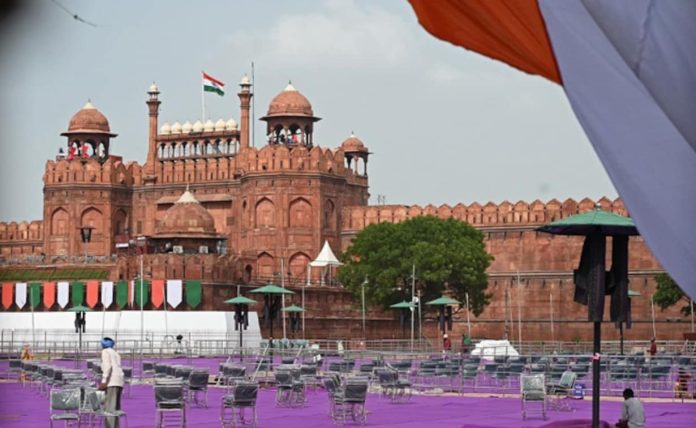Prime Minister Narendra Modi’s address on 15th August — the last Independence Day speech before the general elections next year, will be scrutinised with a fine tooth comb. Modi, a powerful orator, is expected to outline India’s rise on the world stage, besides focusing on the developments at home which include infrastructure and manufacturing boost. The Prime Minister may also touch upon the G20 highlights under India’s presidency while once again laying the thrust on the country’s democratic framework.
This year’s celebrations will be high pitched as it will culminate the ‘Azadi Ka Amrit Mahotsav’ celebrations, which were launched by Modi from Sabarmati Ashram in Ahmedabad on March 12, 2021, an official statement said.
The Prime Minister will attempt to inject renewed vigour at a time when the focus is on ensuring that the country attains the status of “developed nation’ by 2047, sources said.
Modi, at different fora, has repeatedly highlighted that India is a vibrant democracy. “India is the mother of democracy,” is the line that has been promoted as part of the G20 deliberations.
Modi in his last year’s Independence Day address had underlined the need to maintain respect for women and boost “Nari Shakti” or woman power. He said that women’s participation and their role will form the pillar of India’s growth.
“Our Nari Shakti is being represented in all sectors- in police, villages etc. The more opportunities we give to our daughters, the more they will take us forward,” he said, adding that it is important to ensure that nothing lowers the dignity of women.
He had also voiced five pranas and pledges including de-colonising the mind to foster the rise of India as a developed nation by 2047–a template that had percolated in his subsequent speeches that included re-naming Raj Path to Kartavya Path and installation of the bust of Subhash Chandra Bose at India Gate in the capital.
The recent incidents in Manipur and Nuh on the outskirts of Gurugram have, however, become a cause for concern.
Last week, the Centre announced three new bills in a bid to overhaul existing criminal laws while upholding the sovereignty or unity and integrity of India. The three bills are aimed at repealing the sedition law and replacing the archaic Indian Penal Code (IPC), 1860; the Code of Criminal Procedure (CrPC), 1973 and the Indian Evidence Act, 1872. Under the new structure, the Centre aims to introduce maximum punishment for crimes such as mob lynching and rape of minors.
“When a group of five or more persons acting in concert commits murder on the ground of race, caste or community, sex, place of birth, language, personal belief or any other ground each member of such group shall be punished with death or with imprisonment for life or imprisonment for a term which shall not be less than seven years, and shall also be liable to fine,” it highlights.
Sources said that it is hard to predict what the Prime Minister may say, but Modi might throw more light on the new legal structure that is being proposed, especially at a time when the world focus has shifted to these incidents.
“The proposal to go in for a complete overhaul of the criminal laws is timely and it shows that the Centre is keen to take action,” one of them said.
In May, Modi delivered his 100th Mann ki Baat episode.
In his speeches, Modi with a unique communication style has been targeting the grassroots.
“The Prime Minister is known to pick up issues that are key for nation building. In his speeches, he speaks the language that connects with the masses,” Sajjan Kuma, political analyst and author told India Narrative.
Meanwhile Modi changed his social media accounts DP to the Tricolor. He also urged every citizen to do the same in the spirit of the #HarGharTiranga.
The nation is celebrating Har Ghar Tiranga movement — between 13-15 August.

